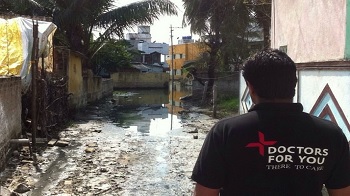
The heavy rains that besieged Tamil Nadu in late 2015 was termed a disaster. The first period of rains began in November in two to three heavy spells before culminating in constant rainfall over a period of 24 hours in the first week of December. The November rainfall had led to saturation of the ground and the water bodies, including lakes and dams, to be filled, and areas to be submerged because of this. When the rains hit hard in December with no respite, the dams were opened leading to overflowing of the rivers in Chennai causing flooding . Other districts that suffered heavy rains and flooding in some areas include the districts of Cuddalore, Kanchipuram, Tiruvallur, Tuticorin and the union territory of Pondicherry among others. Chennai was one of the worst affected with power supply cut to 60% of the city, transport including the airport and railway stations closed and even hospitals closing down . A lot of areas were water logged and a number of houses were flooded, with some areas witnessing water levels rise to the second floor of the apartments. Over 400 people lost their lives (October 28 to December 31 2015), more were displaced with damage to their houses and there was loss of cattle and animal lives and huge economic costs
Due to the flooding and continuous rainfall, people were unable to access health care services and there was an increasing risk of water borne and vector borne disease. In this situation, DFY decided to intervene and prevent the possible outbreak. DFY sent its team to the flood affected areas for Initial Rapid Assessment (IRA) on 7th December 2015 and finalized the area in coordination with the state health department and other Non-Governmental organizations
After the IRA, a medical team was set up and started responding in Chennai. At the same time, another assessment team visited Cuddalore to assess the situation there. The situation was even worse than Chennai and the need to have a separate response unit arose. During this time, the DFY team contacted Government officials to provide response and technical support during this crisis situation. Since DFY has an experience of more than 7 years and has responded in various disasters in India, the Zone 4 monitoring officer Mr. Rajendra Ratnoo (IAS) permitted DFY to work alongside the government during this critical time. The philanthropic organization, Wipro Foundation, extended its kind support to DFY for this national tragedy which affected thousands of people and to carry out medical relief work activities in the affected areas of Tamil Nadu.
In Tamil Nadu, the DFY team conducted the following activities:
Medical camps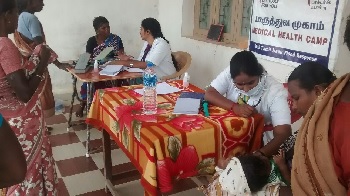
DFY began conducting medical camps across Chennai from the 11th December. Medical camps in Cuddalore and Tiruvallur began on the 21st and 24th December respectively. The aim of the medical camps was to reach the people directly and provide medical access to those whose lines of access were cut or affected. People who had either lost access to their regular medical care or was finding it difficult to access them were the ones the medical camps were hoping to reach and especially those who were affected by the rains and floods. The focus of medical camps shifted to Cuddalore and Tiruvallur towards the end as the situation in Chennai improved and the people in the other two districts were still in need. In Tiruvallur, more than two weeks after the abatements of rains, water stagnation continued in some places. Medical camps in these places therefore proved to be extremely useful to the people.
Child Health Awareness & Deworming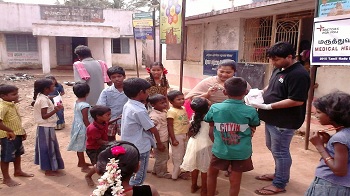
CHA & Deworming camps are conducted for children. Its primary aim is to provide children deworming medication to address the risk of them being affected by the rains, either by drinking the water or other ways. The deworming is combined with a Child Health Awareness talk to spread awareness of basic health and hygiene to the young children. This would help the children be more aware of their surroundings and be careful about the water they drink and to maintain cleanliness around themselves. The first camp was held in Cuddalore on 27th December. Since most schools were still closed as a consequence of the rains, children around the medical camps site and neighbourhoods were given the medications and explained the necessity for being careful. Once schools were reopened, these camps began to be held in schools and occasionally in anganwadis. First aid kits are also handed out to the schools
Adolescent Reproductive and Sexual Health (ARSH)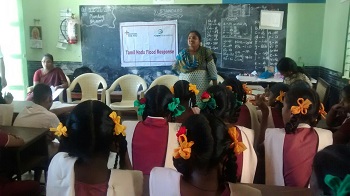
Adolescent Reproductive and Sexual Health (ARSH) camps are conducted for adolescent children. Most adolescent children find it difficult to discuss the physical and emotional changes they go through during puberty. As they are unable to discuss it openly with anyone, they may be under incorrect notions of the changes they are going through and need to be provided the right information and set their concerns at ease. To address these issues, DFY began its ARSH camps to talk to young children on matters related to puberty and health of adolescents. The children are also encouraged to engage in discussions with the team, providing them with an open forum to voice their concerns, either during or after the session. While the talks are mainly focused on girls, the team in Chennai/Tiruvallur went one step further to engage the boys as well where possible, in a separate discussion from the girls. Those who wanted to have a personal talk did so after the sessions.
Health Promotion Talks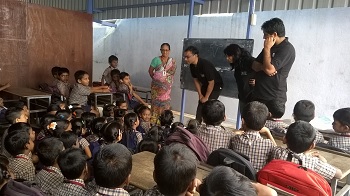
Health Promotion Talks are camps focused on promoting health and hygiene. These are conducted in schools when deworming for the children was recently conducted. As deworming cannot be done for children a second time so soon after the first, it is only the health and hygiene aspect that is conducted. In these situations, the team conducts only Health Promotion Talks in which handwashing techniques are taught, the children are encouraged to be aware of their personal and environmental hygiene. They are also encouraged to engage in a discussion and demonstrate the techniques they have learned.
Sanitation Programme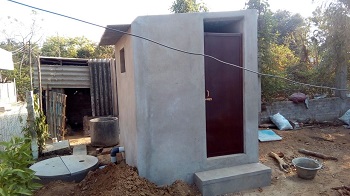
While medical camps were being conducted in Tiruninravur block, Tiruvallur district, which was affected by the floods to a great extent, it was observed by the DFY team that there was a lack of proper sanitation facilities in some areas. An assessment was thereby conducted to this effect in Prakash Nagar, Ambikapuram and Nadukuthagai.
In Ambikapuram, the population were of the lower middle class who did not have proper access to sanitation facilities. The Palwadi School in the area also did not toilets on its premises. Based on this, a need arose for toilets to be constructed in the area which could be used by the children and the people.In Prakash Nagar, the population is more than 200 people form the SC/ST caste of which there were 22 adolescent girls. They did not have proper access to toilet facilities either and there was a need for the same in this area. The situation in Nadukuthagai was similar to that of Ambikapuram wherein palwadi children and over 100 daily wage workers in the area did not have access to proper sanitation facilities. The assessment led to the option of construction of a toilet in the Palwadi School in this place that would be utilized by the children and people.
The toilet construction thereby began in January in Ambikapuram. There is one Indian style toilet that has been constructed. The sump is 2 feet deep and 4 feet wide. The plan was to have toilets maintained by one of the women employed by Goonj as part of their livelihood programme and monitored by the local coordinator. Upon the success of this programme, this programme can be expanded to other places that are in similar situations needing access to proper toilet facilities. The toilet in Ambikapuram caters to over 22 families living there.
Support of WIPRO
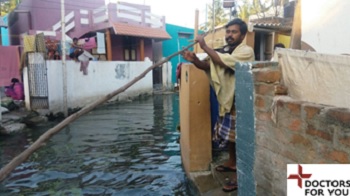
Wipro has become DFY’s partner, supporting its activities since early December 2015. A number of medical camps were conducted in Chennai in the initial phase. Eventually, camps started in Tiruvallur and Cuddalore. During the assessment, it was concluded that Cuddalore was affected to a great extent and required a permanent team to be established to conduct camps on a daily basis which was fulfilled on a short notice. Child health awareness & Deworming camps also began in earnest along with Health Promotion Talks. Adolescent Reproductive and Sexual Health camps are also being conducted in these places. Due to the partnership with Wipro, toilet construction was completed in Tiruvallur district benefitting the locals. There was lack of toilet facilities and sanitation was poor. The children and adolescent girls were the most affected and vulnerable and the programme may be expanded in the near future.
Support of CIPLA Foundation
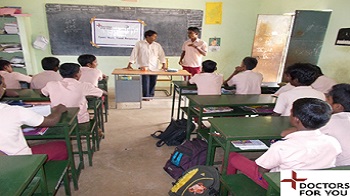
CIPLA Foundation began providing medicines in the initial stages to the DFY team in TN which was given to the patients who came to the camps for no charge. They later on financially supporting DFY on this project . The districts in focus are Cuddalore and Tiruvallur. Medical camps are being conducted in full swing. ARSH camps are the most important aspect of this project aimed at adolescent children. This involves discussion on hygiene and issues related to sexual and reproductive matters. Child Health Awareness & Deworming camps are being conducted but taking into account the fact that most children have already been given the dose, focus is shifting to Health Promotion Talks which encourages and highlights the importance of personal and surrounding hygiene.

